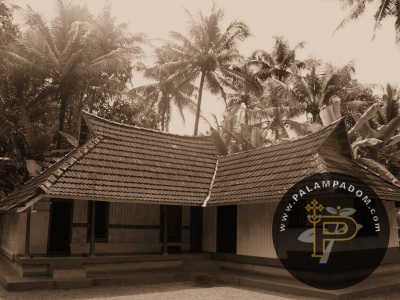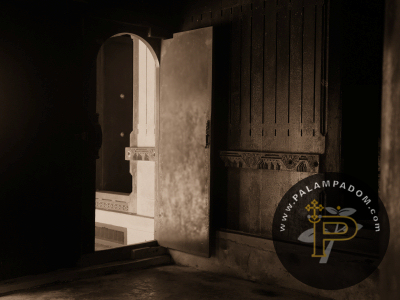"In the beginning God created the heaven and the earth." ![]() Genesis 1:1, The Holy Bible - King James Version.
Genesis 1:1, The Holy Bible - King James Version.
Christianity in India - AD 52 to Present
Christianity in India dates back to AD 52, when Saint Thomas /
![]()
![]() (the Apostle of
Jesus Christ) is believed to have arrived in India at the ancient port of Muziris (near the town of Kodungalloor in the state of Kerala) to spread the
word of our Lord Jesus Christ. His missionary work in India gained momentum when
he reached the village of Palayur (near the town of Guruvayur in the state of
Kerala), where he evangelized several prominent (supposedly, Hindu Brahman)
families, ordained their heads as priests and established the Palayur Church
(one among the so-called Seven-and-a-Half Churches /
(the Apostle of
Jesus Christ) is believed to have arrived in India at the ancient port of Muziris (near the town of Kodungalloor in the state of Kerala) to spread the
word of our Lord Jesus Christ. His missionary work in India gained momentum when
he reached the village of Palayur (near the town of Guruvayur in the state of
Kerala), where he evangelized several prominent (supposedly, Hindu Brahman)
families, ordained their heads as priests and established the Palayur Church
(one among the so-called Seven-and-a-Half Churches /
![]()
![]() , believed to have been
established by Saint Thomas in the state of Kerala). The early Christians of
India, who were evangelized by Saint Thomas, were known as Malankara Nazarenes /
, believed to have been
established by Saint Thomas in the state of Kerala). The early Christians of
India, who were evangelized by Saint Thomas, were known as Malankara Nazarenes /
![]()
![]() - the followers of Nazarene (a name applied to our Lord Jesus Christ in the Holy
Bible) from the region of Malankara (a name applied to south-western India,
with specific reference to the the island of Maliankara (near the ancient port
of Muziris) where Saint Thomas is believed to have begun his missionary work in
India).
- the followers of Nazarene (a name applied to our Lord Jesus Christ in the Holy
Bible) from the region of Malankara (a name applied to south-western India,
with specific reference to the the island of Maliankara (near the ancient port
of Muziris) where Saint Thomas is believed to have begun his missionary work in
India).
In AD 72, when Saint Thomas was martyred in the town of Mylapore (near the
metropolitan city of Chennai in the state of Tamil Nadu), the newly-evangelized
Nazarenes of India were left shepherd-less. In the following years, due to the
lack of leadership and unity, the churches in India (collectively referred to, in the early years of Christianity in India, as the Malankara Church /
![]()
![]() ) became
largely disorganized and Christianity came to the brim of extinction in India.
This weakening period in the history of Christianity in India lasted until the
arrival of Syriac Christians /
) became
largely disorganized and Christianity came to the brim of extinction in India.
This weakening period in the history of Christianity in India lasted until the
arrival of Syriac Christians /
![]() , in AD 345, from the ancient town of Edessa
(under the leadership of Thomas of Cana /
, in AD 345, from the ancient town of Edessa
(under the leadership of Thomas of Cana /
![]()
![]() and accompanied by Mor Joseph of Uraha /
and accompanied by Mor Joseph of Uraha /
![]()
![]()
![]() ).
Subsequently, the churches in India got organized under the Syriac Orthodox
Church of Antioch and all the East (one of the most ancient churches in
Christendom), with the Patriarch of Antioch as its spiritual head. Under the
divine care of the Holy See of Antioch, the churches in India began to prosper
and Christianity in India got a new life. The churches in India have since gone
through several transformations, divisions, and re-organizations.
).
Subsequently, the churches in India got organized under the Syriac Orthodox
Church of Antioch and all the East (one of the most ancient churches in
Christendom), with the Patriarch of Antioch as its spiritual head. Under the
divine care of the Holy See of Antioch, the churches in India began to prosper
and Christianity in India got a new life. The churches in India have since gone
through several transformations, divisions, and re-organizations.
Presently, one of the only churches in India (and the only fraction of the
ancient Malankara Church) that continues to be under the Holy See of Antioch is
the Jacobite Church /
![]()
![]() (presumably named after Mor Jacob Baradaeus /
(presumably named after Mor Jacob Baradaeus /
![]()
![]()
![]() ,
the famous Bishop of Edessa, whose efforts were instrumental in the rise of the
Syriac Orthodox Church to its current preeminence). As an ancient orthodox
church in India, the faith of the Jacobite Church is in strict accordance with the Nicene
Creed (the most widely accepted ancient creed of Christian faith) [+],
while its traditions are a quintessential mix of Malankara Nazarene and Syriac
Christian traditions. The population of Jacobite Christians /
,
the famous Bishop of Edessa, whose efforts were instrumental in the rise of the
Syriac Orthodox Church to its current preeminence). As an ancient orthodox
church in India, the faith of the Jacobite Church is in strict accordance with the Nicene
Creed (the most widely accepted ancient creed of Christian faith) [+],
while its traditions are a quintessential mix of Malankara Nazarene and Syriac
Christian traditions. The population of Jacobite Christians /
![]() , predominantly residing
in the state of Kerala in India, is estimated to be over a million.
, predominantly residing
in the state of Kerala in India, is estimated to be over a million.
![]() Traditional beliefs of
Malankara Nazarenes and Syriac Christians.
Traditional beliefs of
Malankara Nazarenes and Syriac Christians.
![]() Cheriyan, C. V. (1973). A history of Christianity in Kerala: From the Mission of
St. Thomas to the arrival of Vasco Da Gama, AD 52 - 1498. Kerala Historical
Society, India.
Cheriyan, C. V. (1973). A history of Christianity in Kerala: From the Mission of
St. Thomas to the arrival of Vasco Da Gama, AD 52 - 1498. Kerala Historical
Society, India.
![]() Elliott, J. K. (Ed.). (1993). The Acts of Thomas. The Apocryphal New Testament:
A Collection of Apocryphal Christian Literature in an English Translation based
on M. R. James. Oxford University Press, UK.
Elliott, J. K. (Ed.). (1993). The Acts of Thomas. The Apocryphal New Testament:
A Collection of Apocryphal Christian Literature in an English Translation based
on M. R. James. Oxford University Press, UK.
![]() Encyclopædia Britannica. Retrieved from http://www.britannica.com.
Encyclopædia Britannica. Retrieved from http://www.britannica.com.
Palampadom /
![]() - An
Ancient Christian Family
- An
Ancient Christian Family
Legend has it that our founder, Mr. Thomas /
![]() .
.
![]() -
-![]() , who was an early Christian
settler in the village of Velloor (near the town of Kottayam in the state of
Kerala), derived our family name Palampadom /
, who was an early Christian
settler in the village of Velloor (near the town of Kottayam in the state of
Kerala), derived our family name Palampadom /
![]() from Pala Madom /
from Pala Madom /
![]()
![]() - Pala
/
- Pala
/
![]() signifying the historic village where our ancestral family was
evangelized and Madom /
signifying the historic village where our ancestral family was
evangelized and Madom /
![]() referring to the
characteristic dwelling place of Hindu Brahmans.
referring to the
characteristic dwelling place of Hindu Brahmans.
The Palampadom family, which had its humble beginnings in the village of Velloor, has prospered over time into one of the most prominent Jacobite Christian families from India, with members across the world. The members of the Palampadom family are known for the strong leadership and support they have offered, generation after generation, to the 'Malayalee' Jacobite Christian community (our founder Mr. Thomas, 'Vakil' Mr. P. T. Thomas (Gen. II), 'Rajasree' Dr. P. T. Thomas (Gen. III), 'Chevalier' Mr. Eapen Thomas (Gen. III), Mr. P. A. Punnen (Gen. III) and 'Commander' Mr. P. E. Thomas (Gen. IV) were all distinguished leaders of the Jacobite Christian community).
Ancestral Home /
![]() (Velloor, Kerala,
India)
(Velloor, Kerala,
India)
Encompassed by a seemingly endless plantation of rubber trees in the village of Velloor (near the town of Kottayam in the state of Kerala), stands the centuries-old ancestral home of the Palampadom family. This was the home of our founder Mr. Thomas - this is where it all started, this was our foundation, and it remains our inspiration.
 |
 |
|
 |
||